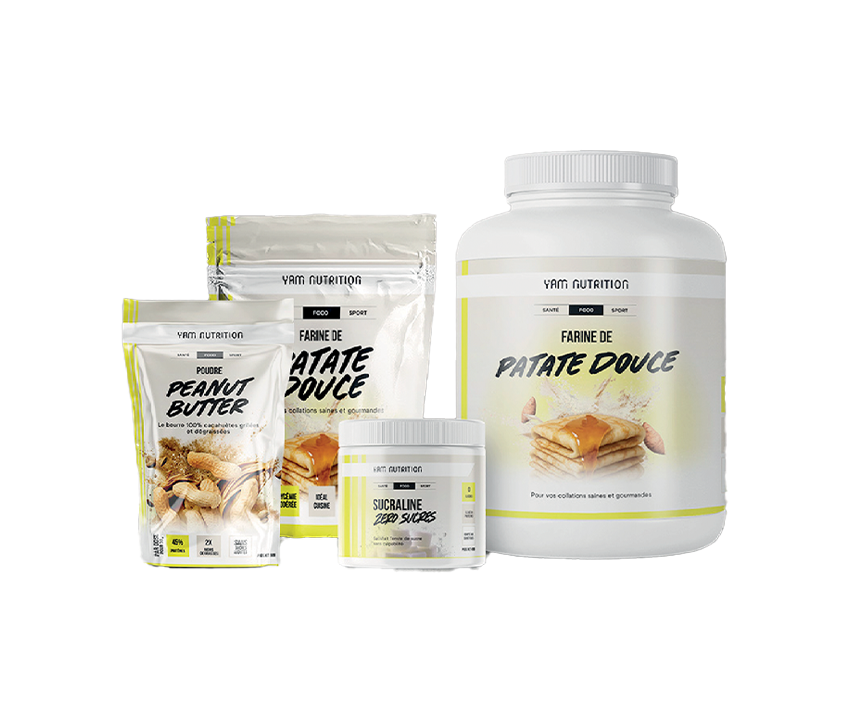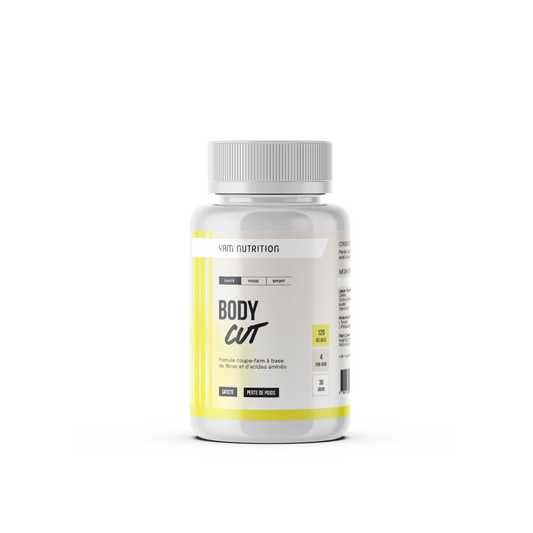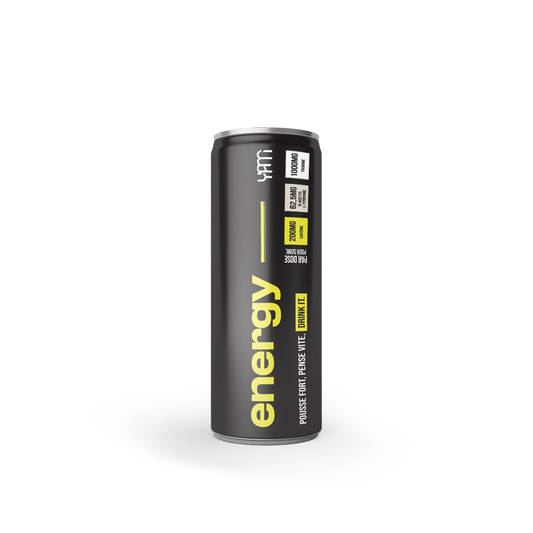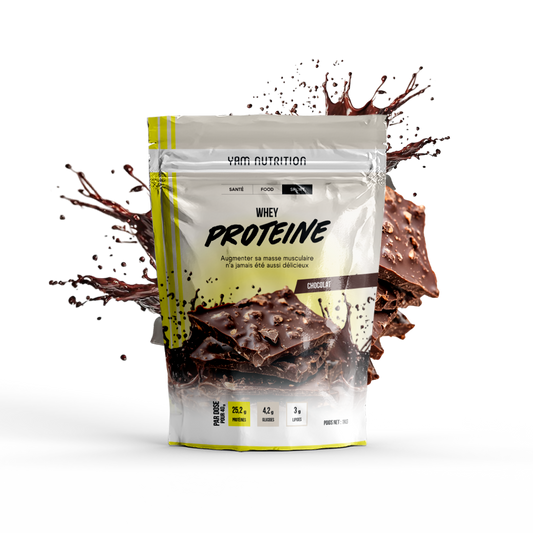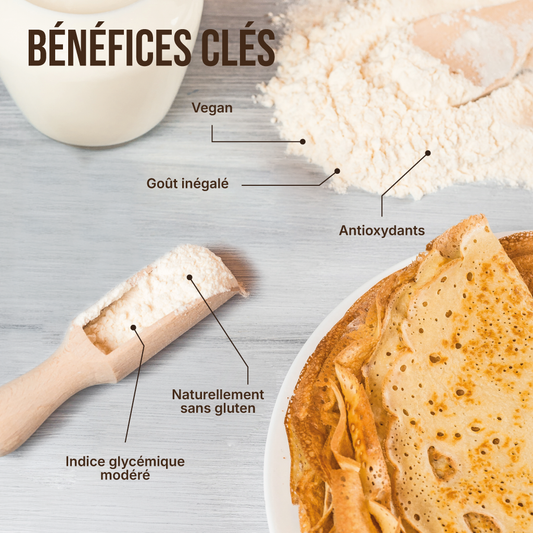What foods should you eat before training to maximize energy?

Sommaire
- Why is pre-workout nutrition crucial?
- What types of foods and nutrients should you eat before training?
- What energy foods should you avoid before a weight training session?
- Energy-boosting foods: top 5 to eat before exercise
- Focus on the glycemic index and energy release
- When and how to eat before training to maximize the effects?
- Adapt your diet to the objective of the session
- Example pre-workout snacks by time of day
- Conclusion: energy is also prepared on the plate and in your food...
What you need to know about the food/energy ratio:
- Eating before exercise is strategic : not just to “hold on”, but to perform.
- Complex carbohydrates are the key : stable energy, no crash.
- Light protein = metabolic support + satiety , without adding weight.
- Avoid fat, excess fiber and isolated sugars just before you train.
Showing up to training on an empty stomach, quickly eating an ultra-processed snack, or relying on strong coffee as your only source of energy … these are mistakes that are much more common than you might think. However, What you eat before a workout can literally transform your performance , whether you're in the middle of a workout Whether you're looking for mass gain , cutting, or simply looking for maximum efficiency under the bar or on the track, eating before you train means that a simple snack ( protein shake , moderate carbohydrate intake, etc.) can make a difference in terms of athletic performance, strength, and recovery between sets.
Eating well before exercise is not just about “having something in your stomach”. It is a full-fledged energy strategy , which influences your endurance, your strength, your concentration… and even your recovery. In this guide, I will show you which foods to eat, which to avoid, when and why , to boost your performance without impacting your digestion.
Caffeine without the crash thanks to NewCaff-75™ technology An appetite suppressant to help you stick to your diet without giving in by regulating your appetite. The energy drink 2.5x more caffeinated than average Building muscle mass has never been so delicious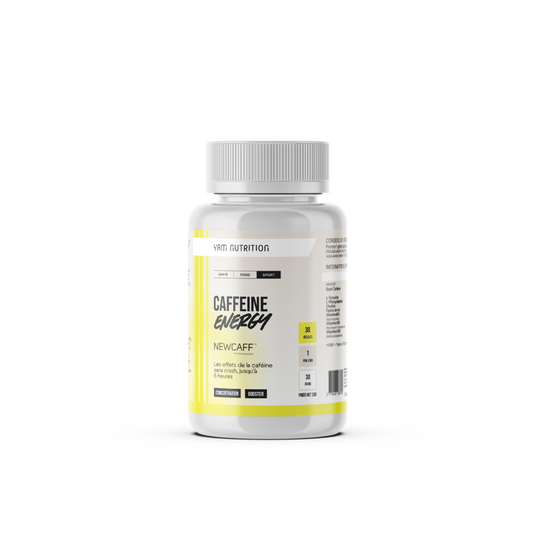
Caffeine Energy
29,90 €
Sale price
25,40 €
Body Cut Appetite Suppressant
Sale price
29,90 €
YAM Energy Drink
Sale price
From 3,00 €
Whey Protein
Sale price
From 37,90 €
📌 Whether you are an experienced athlete or a passionate beginner, you will leave with concrete answers to know exactly what to eat before training , without falling into the classic traps. This is what we will call “energy foods”.
Why is pre-workout nutrition crucial?
Before thinking “what to eat”, you need to understand Why eat . Pre-workout nutrition isn't a logistical detail or a Pavlovian reflex to "keep you going." It's a strategic metabolic lever , a determining element of the quality of your performance , both physical and mental. Knowing how to eat well before a weight training or cardio training session preserves your sports performance and your progress in the weeks and months that follow…
🧠 The brain also runs on energy… and it will let you know
One of the most common mistakes is to think that only the musculature needs fuel. In reality, The brain is one of the first organs to consume glucose , and if it's lacking, you'll feel it: drop in concentration , slower reaction time , motivation at half-mast , impaired coordination . Remember that your muscles and nervous system are linked since this is a neuromuscular mechanism.
You're not “just tired”: your nervous system is running on empty .
🔋 Glycogen: your most precious energy reserve
When we talk about energy for training, it is impossible to ignore the glycogen . This complex sugar is stored:
- in the muscles : to fuel the effort locally,
- in the liver : to keep blood sugar (blood sugar) levels stable during exercise.
💡 In the absence of nutritional intake before exercise, glycogen reserves decrease , and with them, the ability to maintain a constant intensity . You start off at full throttle, then the engine stalls. You simply lack the energy and ATP to fuel muscle mass and the nervous system.
⚠️ The risk of reactive hypoglycemia
Eat anything, anytime, can be as harmful as eating nothing at all . A food that is too sweet and isolated, eaten too close to the effort, can cause a insulin peak , followed by a rapid drop in blood sugar when you need energy most. Result: quick change of direction , nausea , bloating, or even dizziness .
It's not weakness. It's a timing and composition error nutritional value of your pre-workout snack.
💪 Well-thought-out pre-workout nutrition helps to:
- Delay the onset of fatigue muscular and nervous,
- Support the force , the power And explosiveness ,
- Stabilize the blood sugar and so mental energy ,
- Optimizing the combustion of energy substrates (carbohydrates and lipids),
- Avoid muscle breakdown (catabolism) during prolonged exercise.
- Promote faster post-exercise recovery
🧭 Towards a personalized food strategy
It does not exist no single universal answer to the question “what to eat before sports”. It all depends on the time of the session , of its intensity , of your digestive tolerance , and your goals (strength, endurance, cutting, mass gain, etc.). But what is certain is that eating strategically is train effectively . It also means preparing your recovery intelligently.
This is what we will cover in detail in the rest of the guide: the types of nutrients to favor , the most suitable foods , mistakes to avoid And the optimal timing to transform your plate into real performance booster sports .
What types of foods and nutrients should you eat before training?
Before any session, whether it is focused on strength, endurance or hypertrophy muscular , your body has need fuel . But not just any fuel. macronutrients (carbohydrates, proteins, lipids) do not all have the same role at the time of the effort, nor the same assimilation kinetics . This is why you cannot eat anything, anyhow, before exercise.
👉 The right pre-workout nutritional choice will always depend your timing, your digestive tolerance and your session objective .
But in any case, the contribution in carbohydrates and in proteins plays a role key in energy management immediate , while the Lipids should be modulated with caution . Here's how...
🥖 Carbohydrates: the first source of muscular energy
Carbohydrates are the top priority for the body before exercise. Why? Because they are the ones who are directly converted into glucose , then stored as glycogen in the muscles and liver. And it is this glycogen that you burn from the first repetitions or strides. The latter will then be converted into ATP (adenosine triphosphate) to fuel the exercising muscles. Foods rich in slow-digesting carbohydrates are the ideal example of energy foods . They allow rapid release of energy.
The higher the intensity of the effort, the more the share of energy from carbohydrates increases . Without them, there is no sustainable performance.
👉 But not all carbohydrates are created equal ...
Carbohydrates at moderate or low glycemic index
They allow a Progressive release of energy , without peak or crash. Best if eaten after a meal 2 to 3 hours before the effort.
Carbohydrates at high glycemic index
Useful only in case of very short timing (15 to 20 minutes before the effort), or for efforts explosive and short-lived . Be careful: they must be well chosen and never consumed alone .
🥣 Examples of high-carb foods for training
| Food | Nutritional interest |
|---|---|
| Oat flakes | Rich in complex carbohydrates, fiber, beta-glucans, and B vitamins. Provides steady energy release. Perfect 2 hours before exercise. |
| Wholemeal bread | Good source of complex carbohydrates, moderate glycemic index, rich in fiber and minerals. |
| Ripe banana | Source of fast but natural carbohydrates (glucose + fructose), rich in potassium. Ripe bananas are low in fiber. Practice 30 to 60 minutes before sports. |
| Dates / Figs | Concentrated natural sugar. A very useful carbohydrate source for a quick boost. without ultra-processed products . |
| Sweet potato | Complex carbohydrates + fiber + micronutrients (beta-carotene, potassium, manganese). Best eaten cooked. |
| Basmati rice (cooked) | Moderate glycemic index (especially if chilled). Digestible and effective. |
Each food has its optimal timing . The richer and more complex it is, the more in advance it must be consumed .
🍳 Proteins: metabolic support not to be neglected
Often forgotten in the pre-workout equation, However, proteins have several advantages , even before exercise.
- They help to stabilize blood sugar levels by slightly slowing down the absorption of carbohydrates (useful synergistic effect).
- They limit muscle catabolism by ensuring the presence of amino acids circulating during exercise.
- They improve satiety and avoid cravings that can impair concentration.
- They convert very little to body fat unlike sugars taken in excess before or after exercise
Be careful though: we are talking here of a moderate intake , of proteins easy to digest , and not a heavy protein meal.
🥚 Examples of easily digestible protein foods
| Food | Assets |
|---|---|
| Egg white | Rich in complete proteins, almost fat-free, very digestible. Very good source of leucine. |
| 0% Greek yogurt | Good protein/carbohydrate ratio, low in fat, contains calcium. |
| Plant-based protein powder (pea, rice, hemp) | Easy to digest, lactose-free, and convenient as a mixed snack with fruit. Natural source of fiber. |
| 0% white cheese | Source of slow casein, ideal if the meal is far from the session. |
| Silken tofu | Light, rich in protein, low in fat, good digestive tolerance. |
🎯 The right reflex: associate a small dose of protein with your carbohydrates, for a Better energy metabolism and increased hormonal stability . As a snack, take two hours before exercise.
🥑 Lipids: to limit before exercise?
Lipids are not our enemies. On the contrary, they are a good source of energy. However, their slow assimilation and their impact on digestion makes them less suitable as an immediate pre-workout , especially for short and intense efforts. These are not the best “energy foods” to take before exercise. They slow down gastric emptying , therefore delay the arrival of carbohydrates in the blood . This can hinder access to energy at the wrong time .
That said, some essential fatty acids can have a place if the session is long or if we train on an empty stomach , in the case of a ketogenic or low-carb diet adapted. This is also the case for MCTs (or TCM in French), medium-chain triglycerides.
⚠️ For the majority of athletes: we reduce lipids in the 2 hours before training , and we reserve them for other meals of the day .
🧭 In summary:
- Moderate GI complex carbohydrates → priority for energy over a long period of exercise
- Light and digestible proteins → metabolic support before exercise
- Limited or absent lipids just before exercise → better digestion and bioavailability of energy
What energy foods should you avoid before a weight training session?
Eat before a session, Yes - but not just anything . Some foods, although healthy in other contexts, can directly harm your performance if they are poorly chosen before the effort.
Here are the food profiles to avoid :
1. Foods that are too fatty
Fats slow down digestion. Just before a session, this can:
- To provoke a feeling of heaviness ,
- Delay the absorption of carbohydrates useful during exercise,
- And unnecessarily mobilize digestive energy .
🛑 Absolutely avoid: cold cuts, aged cheeses, pastries, fried foods, fatty sauces, avocados in large quantities.
2. Foods rich in insoluble fiber
Fiber is essential… but poorly placed before training , they become annoying:
- Bloating , digestive discomfort, stomach aches
- Slowing down of transit intestinal (or unwanted acceleration).
🛑 Avoid: raw vegetables (carrots, cabbage, peppers), legumes (lentils, chickpeas), industrial whole-wheat bread too rich in bran. They can disrupt intestinal assimilation during exercise.
3. Foods rich in isolated fast sugars
Drink a soda, eat candy or a candy bar solo , 30 minutes before a workout is a false good idea :
- Rapid rise in blood sugar,
- Insulin spike ,
- Followed by a sudden drop in energy : reactive hypoglycemia.
🛑 Avoid: industrial fruit juices, sugary puffed cereals, sweets, jams without a source of fiber or protein.
4. Ultra-processed products , particularly dubious foods…
The problem of processed foods is not just one nutrient, but the whole:
- Additives, artificial colors
- Hydrogenated and saturated fats
- Excess sugar or salt
- Unbalanced nutritional profile.
These products feed poorly , disrupt digestion And do not provide any sustainable fuel .
🛑 Avoid: classic chocolate bars, industrial biscuits, salty snacks, low-end meal replacements.
👉 The right pre-training reflex? Avoid anything that overloads the digestive system and does not bring a stable energy and sustainable. This doesn't mean not eating anything — it means eat smart . To this end, favor energy foods !
Energy-boosting foods: top 5 to eat before exercise
You don't have to fill your plate to perform. Sometimes, 5 good, well-chosen foods are better than 15 average ones. Here are the must-haves for natural, stable and efficient energy :
1. The banana
Easy to digest, rich in simple carbohydrates (glucose, fructose) + potassium → perfect for strength or endurance efforts.
Ideal timing : 30 to 60 min before.
2. Oat flakes
Complex carbohydrates , beta-glucans , soluble fibers, B vitamins: gradual energy and good satiety.
Ideal timing : 1h30 to 2h before.
3. Honey
A true natural fuel. It combines glucose + fructose + antioxidant properties .
Use in small doses on wholemeal bread , a homemade pancake or mixed with yogurt.
4. Dates
Natural sugar concentrate , without fats or additives. Widely used by endurance athletes for their rapid “boost” effect.
2 to 3 dates are enough 30 min before short or explosive training.
5. Wholemeal bread + almond puree
A balanced combo: moderate GI carbohydrates + a little good fat + magnesium. Provides sustained energy without digestive overload.
Timing : 1 hour to 1 hour 30 minutes before.
Focus on the glycemic index and energy release
The glycemic index (GI) measures how quickly a food raises blood sugar (glycemia). The higher the GI, the faster the sugar enters the bloodstream.
👉 Why is this important?
Because a liberation too fast causes a insulin spike , followed by a energy crash . Thus, you increase the risk of reactive hypoglycemia.
🟢 Moderate to low GI = stable energy
🔴 High insulated IG = sawtooth energy
The ideal is therefore to:
- Favor foods with a moderate GI , especially if the meal is eaten 1.5 hours or more beforehand.
- Combine fast carbohydrates to fibers or proteins for modulate the glycemic response if you eat closer to the session.
When and how to eat before training to maximize the effects?
You have selected the good foods , but timing and quantities are just as crucial. Good pre-workout nutrition is a question of dosage, quantity and timing (good timing!).
🕒 How long before should you eat?
The timing depends on the type of meal and your digestive tolerance:
- Full meal (with complex carbohydrates , light protein, low fat) → 2 to 3 hours before
- Lighter snack (fast carbohydrates + a little protein) → 30 to 60 minutes before
- Specific drink or shaker → 15 to 30 minutes before , depending on the composition
⚠️ The closer you eat to the sitting, the simpler and more digestible the meal should be.
🍽️ How much food should you eat?
It's not about "getting you in," but about recharge sufficiently without weighing it down . Here are some guidelines:
- Solid meal : 1 to 2 g of carbohydrates per kg of body weight (e.g. 100-150 g of carbohydrates for a 70 kg athlete), with 20 to 30 grams of protein.
- Snack : 30 to 50g of carbohydrates + 15 to 20 grams of protein.
🌅 What to eat if you train early in the morning?
Two practical options:
- Quick snack : banana + 1 spoonful of honey + 1 dose of vegetable protein (or hydrolyzed whey) in a small volume of water.
- Optimized fasting training : possible for short or moderate sessions, provided you ate well the day before . You can add a intra-training shaker rich in fast carbohydrates and amino acids to avoid catabolism.
🎯 A contribution in essential amino acids (as Bombi of YAM Nutrition ) is particularly relevant in this context.
🧃 With or without pre-workout shaker?
A shaker well formulated , low in fat, rich in fast carbohydrates moderate + proteins highly digestible can be ideal when:
- You are in a hurry
- You cannot tolerate solid foods before exercise.
- You need a quick boost , without digestive overload
In this case, prefer a vegetable protein isolated or a hydrolyzed whey , mixed with a source of natural carbohydrates (honey, juice, cyclodextrin powder).
Adapt your diet to the objective of the session
A good nutritional plan of pre-training must align with the intensity and nature of your training sporty .
🏋️ Focused session strength
Objective : power, nervous activation, explosiveness.
Need : fast energy without glycemic peak, mental clarity , no heaviness.
✅ Moderate carbohydrates + some protein → wholemeal bread + almond puree, banana + vegetable protein.
💪 Focused session hypertrophy muscular
Goal: volume, congestion, prolonged effort.
Need : high glycogen stores , low protein intake, maintenance of blood sugar levels.
✅ More complete meal (3 hours before training) or dense snack → basmati rice + turkey, oatmeal + Greek yogurt.
🫀 Session cardio / HIIT
Objective: endurance, intensity, explosiveness.
Need: quickly available energy, ultra-light digestion.
✅ Prefer carbohydrates fast but stable assimilation → dates, white bread + homemade jam, natural carbohydrate drink.
🏃 Long session or endurance , which energy foods should you favor?
Objective: duration, energy consistency, fatigue resistance .
Need : slow fuel + hydration , avoid dips.
✅ Complex carbohydrates + electrolytes → sweet potato, wholemeal bread, mineralized drink.
Example pre-workout snacks by time of day
Here are some ideas adapted to the timing of your sessions.
| Session schedule | Recommended snack | Details |
|---|---|---|
| Early morning (6am–8am) | Banana + 1 dose of vegetable protein | Light, digestible, quick to assimilate |
| Late morning (10am–12pm) | Wholemeal bread + hazelnut puree + hot drink | Stable energy, good satiety |
| Early afternoon (1–3 p.m.) | Oat flakes + 0% fat cottage cheese + cinnamon | Complex carbohydrates + slow proteins |
| End of day (5 p.m.–7 p.m.) | Homemade smoothie (banana + plant-based milk + honey + rice powder) | Quick to prepare, well tolerated |
| Evening (8 p.m.–10 p.m.) | Rice cakes + almond butter + infusion | Digestible carbohydrates, intestinal comfort |
🧠 Tip: Avoid caffeine after 5 p.m. unless you tolerate it perfectly. It can disrupt sleep, even though it boosts energy.
Conclusion: energy is also prepared on the plate and in your food...
We have seen it throughout this guide: Pre-workout nutrition is a direct lever for performance sporty . It influences your muscular energy, your concentration, your recovery… and your motivation.
📌 It's not just a habit: it's a conscious, personalized strategy, adjusted to your body and your goals .
And to go further, some food and nutritional supplements can become allies of choice . These food supplements do not replace a balanced diet, but give it additional efficiency , adapted to the lifestyle of demanding athletes . Combine nutritional supplements (protein powder, vitamins , omega 3 …) to your diet intelligently could easily widen the gap in terms of sports and athletic results.
Eric MALLET
Spécialiste en Nutrition Sportive
